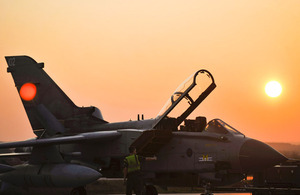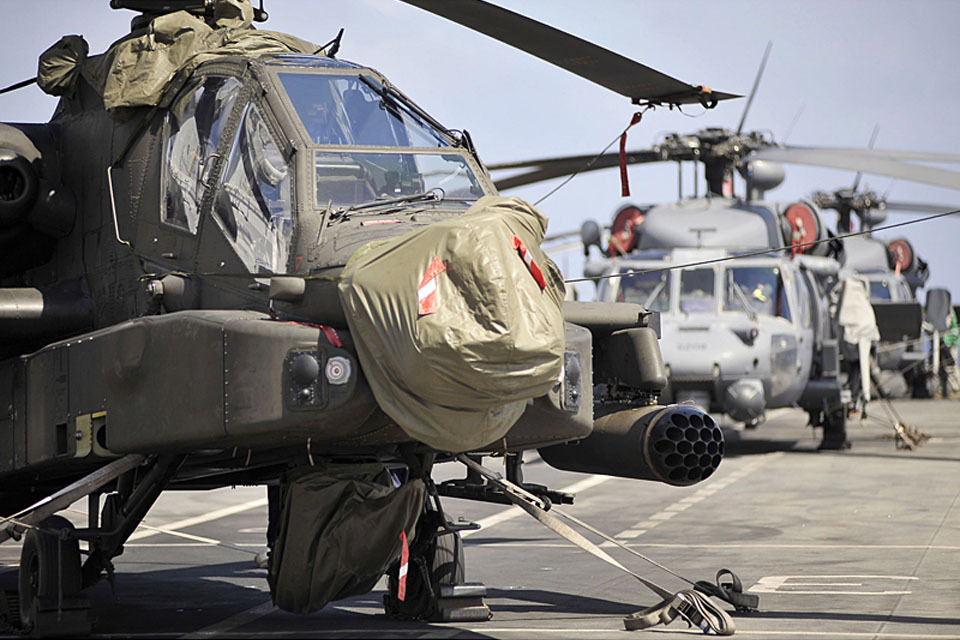UK forces' contribution to Libya campaign
With the announcement today by the United Nations Security Council to end the mandate for operations in Libya, the UK's Chief of Joint Operations (CJO), Air Marshal Sir Stuart Peach, has highlighted the contributions made by UK forces.

A Tornado GR4 aircraft is pictured against an Italian sunset at Gioia del Colle air base [Picture: Senior Aircraftman Neil Chapman, Crown Copyright/MOD 2011]
At a media briefing held earlier today, 27 October, in the Ministry of Defence Main Building, Air Marshal Peach began with a brief narrative of the operation recalling that, in February, as a result of the deterioration of the situation in Libya, there was quite a lot of work for Permanent Joint Headquarters (PJHQ) to do in terms of getting entitled persons out of the country:
The first thing I want to say about that is to say thank you to the government and the people of Malta for letting us form a base there. In terms of geography, that gave us a special advantage to deal with the situation.
PJHQ, under the Air Marshal’s command, is a high-readiness group of people, ready to deploy rapidly around the world when something happens. In this case, they formed a non-combatant evacuation coordination cell, and by doing this avoided the situation where potentially three different countries could have sent three different aircraft in a disorganised way to pick up the same group of people:
It was a very soft attempt to coordinate across a group of nations who were all trying to do the same thing,” said the Air Marshal.
It was very successful. It was quite a tough call. We took a risk on the Sunday in particular, when we went deep with a C-130 into the desert. It was uncertain because of the number and nationality of the people there kept fluctuating.
As part of the same objective, Type 22 frigate HMS Cumberland was then moved into Benghazi harbour, which the Air Marshal also described as very uncertain at the time.
I think it was a very successful part of the story, we evacuated 1,400 people out of a total of 4,500.
An added advantage gained from this operation, known as Op DEFERENCE, was that it built up knowledge of the country and provoked some thinking about what might happen next:
We were a bit surprised at how quickly things moved on,” said the Air Marshal. “We had the USCR 97 at the end of February, the National Transition Council established 5 March and then the no-fly zone was established. In quick time, some very successful operations were developed leading up to the hand over to NATO.
First and foremost a maritime embargo was established in which the Royal Navy played a key role with a number of ships and people who understood very well command and control in these situations and how to do boarding and embargo operations:
The influence of UK officers and men and women in command and control throughout this operation is something we should pay tribute to,” said Air Marshal Peach.
A no-fly zone was quickly established. Having been personally involved in four of these in previous times, the Air Marshal said that, “we know how to do that.”
NATO then took over, naming the operation ‘UNIFIED PROTECTOR’, and set up its HQ in Naples, a traditional NATO control centre:
One of the important features of this operation is the harmony and the importance of the role of Italy,” said Air Marshal Peach, “harmony because the Italian military authorities have been extremely good hosts for the UK, and the importance of the geography is pretty obvious. The amount of support they gave us, bases, fuel, logistics, command and control was and is extremely important.
In supporting civilians who were being “quite aggressively killed by the Libyan forces,” Air Marshal Peach said that what he wanted to highlight above all was the importance of the precise application of force:
We judged, and I continue to judge, that unnecessary damage, or worse, the causing of civilian casualties would be a strategic liability for the campaign. The discipline of the ship, aircraft and helicopter crews are something I want to record.
Working with NATO partners, Apache attack helicopters were introduced, mounted from HMS Ocean, to provide a useful tactical capability and, at the request of the NTC special advisers, “not Special Forces,” were introduced and who played a useful role in supporting the NTC.
The key military objective at this point in addition to protecting civilians from pro-Gaddafi forces was reducing the command and control of the regime to stop the attack on their own people.
Understanding what was going on inside Libya was a key task throughout, not just along the coastal strip but deep inside the country as well:
We also had some unusual tasks,” said Air Marshal Peach, “which I would not have predicted - for example, guarding Libyan dinars contained in a RAF C17 flown into Benghazi to get the money flowing; done, for obvious reasons, in complete secrecy.

Army Air Corps Apache and United States Air Force HH60 helicopters on board HMS Ocean, supporting Operation UNIFIED PROTECTOR in the Mediterranean [Picture: Leading Airman (Photographer) Guy Pool, Crown Copyright/MOD 2011]
As the Gaddafi regime fell back on traditional homeland areas the fighting in and around Sirte was very difficult as the need for the disciplined application of force was more important than ever:
At this point after all this investment of effort, we were not going to spoil it by being wanton in the application of force. So a number of times we held back, we held off, we made sure that the rules of engagement were strictly followed,” said Peach.
We have now reached the point where we are continuing to support operations awaiting direction from the North Atlantic Council, which we expect in the next few days.
The themes and lessons that have been identified by PJHQ include precision in the use of weapons which has been, the Air Marshal felt, world class:
The accuracy, the consistency, and the predictions of the serviceability of our weapons has been confounded. The British weapons in particular have been world class. The low collateral damage of Brimstone is at the top end of anybody’s inventory in the world,” he said.
But this precision, the Air Marshal argued, was not just because the bombs were good, but because of the ways in which the ships crews and the air crews are using and interpreting the rules of engagement, using their weapons in a disciplined way, guided by the AWACS aircrews operating 24-hours-a-day.
The helicopters that deployed provided the ability to go as deep as 50 miles (80km) inland against a series of military targets. Video footage shows a crew taking out a target with two hellfire missiles; the second being fired and destroying the vehicle after those on the ground had been given time to flee.
At no point,” said the Air Marshal, “have British servicemen targeted individuals.
The Tornados carried British-designed and British-built Brimstone missiles, which proved to be a world class weapon system. The Tornado, although undeniably an old platform, is bang up to date in terms of what’s going on inside the cockpit as far as control software, intelligence and reconnaissance is concerned, the Air Marshal said, and he also praised the ground crews who worked round the clock to make sure the aircraft kept flying.
What is a new aircraft is the Typhoon, and the Air Marshal said the aircraft had been adapted to carry weapons such as laser-guided bombs.
He explained that the complimentary way Typhoons worked alongside the Tornados, using their targeting pods to create additional intelligence and reconnaissance, was very important:
Typhoon has been a great success on this operation,” he said. “We have also been very pleased with the way that the Army Air Corps adapted to life on the ocean wave aboard HMS Ocean; a first for the UK.
Air Marshall Peach closed by saying that the UK did not do all this alone, and that the success of the operation had depended on the input of 19 partner countries.